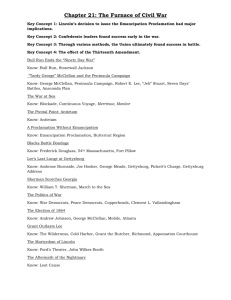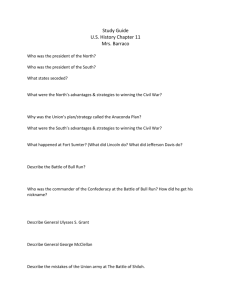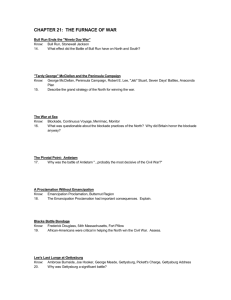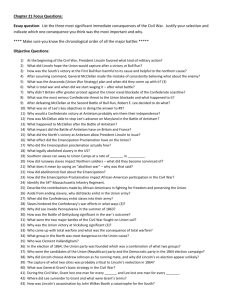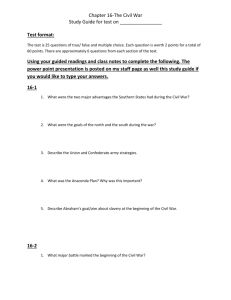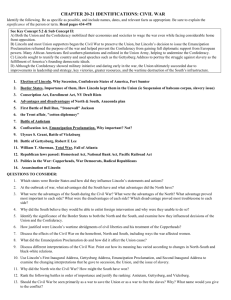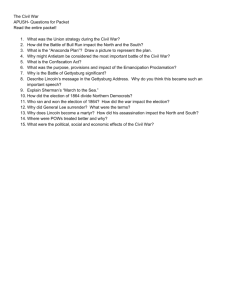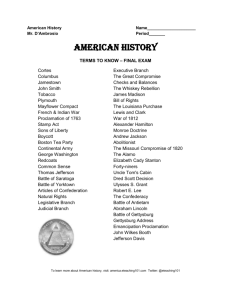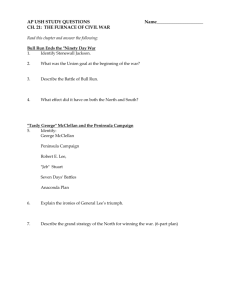AP U.S. History Chapter 21: The Furnace of Civil War: 1861
advertisement
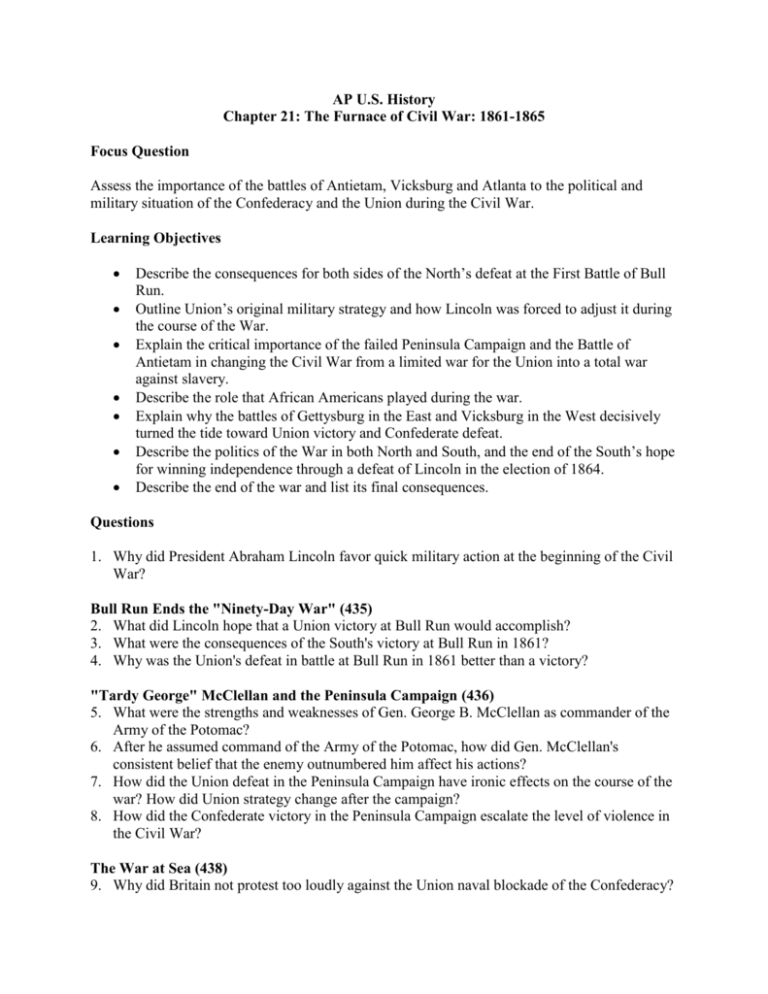
AP U.S. History Chapter 21: The Furnace of Civil War: 1861-1865 Focus Question Assess the importance of the battles of Antietam, Vicksburg and Atlanta to the political and military situation of the Confederacy and the Union during the Civil War. Learning Objectives Describe the consequences for both sides of the North’s defeat at the First Battle of Bull Run. Outline Union’s original military strategy and how Lincoln was forced to adjust it during the course of the War. Explain the critical importance of the failed Peninsula Campaign and the Battle of Antietam in changing the Civil War from a limited war for the Union into a total war against slavery. Describe the role that African Americans played during the war. Explain why the battles of Gettysburg in the East and Vicksburg in the West decisively turned the tide toward Union victory and Confederate defeat. Describe the politics of the War in both North and South, and the end of the South’s hope for winning independence through a defeat of Lincoln in the election of 1864. Describe the end of the war and list its final consequences. Questions 1. Why did President Abraham Lincoln favor quick military action at the beginning of the Civil War? Bull Run Ends the "Ninety-Day War" (435) 2. What did Lincoln hope that a Union victory at Bull Run would accomplish? 3. What were the consequences of the South's victory at Bull Run in 1861? 4. Why was the Union's defeat in battle at Bull Run in 1861 better than a victory? "Tardy George" McClellan and the Peninsula Campaign (436) 5. What were the strengths and weaknesses of Gen. George B. McClellan as commander of the Army of the Potomac? 6. After he assumed command of the Army of the Potomac, how did Gen. McClellan's consistent belief that the enemy outnumbered him affect his actions? 7. How did the Union defeat in the Peninsula Campaign have ironic effects on the course of the war? How did Union strategy change after the campaign? 8. How did the Confederate victory in the Peninsula Campaign escalate the level of violence in the Civil War? The War at Sea (438) 9. Why did Britain not protest too loudly against the Union naval blockade of the Confederacy? 10. Why did the CSS Virginia (formerly USS Merrimack) represent the most serious Confederate threat to the Union blockade? What was the fate of the Virginia? The Pivotal Point: Antietam (440) 11. Why, after defeating Pope at the Second Battle of Bull Run, did Robert E. Lee decide to invade the Union via Maryland? 12. What were Lee's key objectives in invading Maryland? 13. Why was a victory at Antietam probably the Confederates' best hope of independence? 14. How did the Union's discovery of Robert E. Lee's battle plans affect the outcome of the Battle of Antietam? 15. After Gen. McClellan halted Lee's troops at Antietam, why did Lincoln remove him from his field command? 16. Why was the Battle of Antietam the major turning point of the Civil War? What did the North's victory allow President Lincoln to announce? A Proclamation Without Emancipation (441) 17. Which slaves did the Emancipation Proclamation declare free when it was issued in 1863? 18. Following the Emancipation proclamation, what proportion of Southern slaves ran away to Union camps? Why did Northern soldiers become increasingly convinced of slavery's evils? 19. What were the effects of the Emancipation Proclamation on the outcome of the war? 20. What action legally abolished slavery in the United States? 21. What were the adverse effects of the Emancipation Proclamation in the North? Blacks Battle Bondage (443) 22. How did the Emancipation Proclamation change the way that blacks could battle slavery during the Civil War? 23. What did African Americans who fought for the Union Army in the Civil War experience? How effectively did they fight? 24. Aside from ending slavery, why did blacks enlist into the Union Army? 25. Why did the Confederacy wait until almost the very end of the war to enlist slaves into its army? In what ways did slaves hinder the Confederacy's war efforts? Lee's Last Lunge at Gettysburg (445) 26. What do the Battles of Antietam and Gettysburg have in common? 27. What were Robert E. Lee's goals in deciding to invade the North through Pennsylvania? 28. Why was the Battle of Gettysburg of major significance? Why has Pickett's Charge been termed the "high tide of the Confederacy"? The War in the West (446) 29. Why was Vicksburg--the "Gibraltar of the Confederacy"--of vital importance to the Confederate cause? 30. Why was the Union victory at Vicksburg of major importance? Examining the Evidence (447) 31. What was the significance of the Gettysburg Address? Sherman Scorches Georgia (449) 32. In what ways was General William T. Sherman a pioneer of the strategy of total warfare? How did Sherman's style of warfare result in a shorter war that saved lives? The Politics of War (450) 33. What was the group in the North most dangerous to the Union cause? The Election of 1864 (451) 34. In the election of 1864, why did the Republicans join with the War Democrats to found the Union party? Why was Andrew Johnson chosen as Abraham Lincoln's running mate? 35. In the l864 election, the Democratic Party nominated George McClellan to oppose Lincoln's reelection. How did the party and McClellan differ on the war? 36. How did Union successes at Mobile and Atlanta affect the election of 1864? Grant Outlasts Lee (453) 37. Once he became Commanding General of the U.S. Army, what was Ulysses S. Grant's basic strategy? How did Grant's casualty rate compare to Lee's during the Civil War? The Martyrdom of Lincoln (456) 38. How did the assassination of Abraham Lincoln turn out to be a calamity for the South? The Aftermath of the Nightmare (460) 39. In what ways was the Civil War the supreme test of American democracy? Varying Viewpoints (462) 40. What were the objective results of the Civil War? 41. Why do some scholars dispute whether the Civil War marked a watershed in American history?
